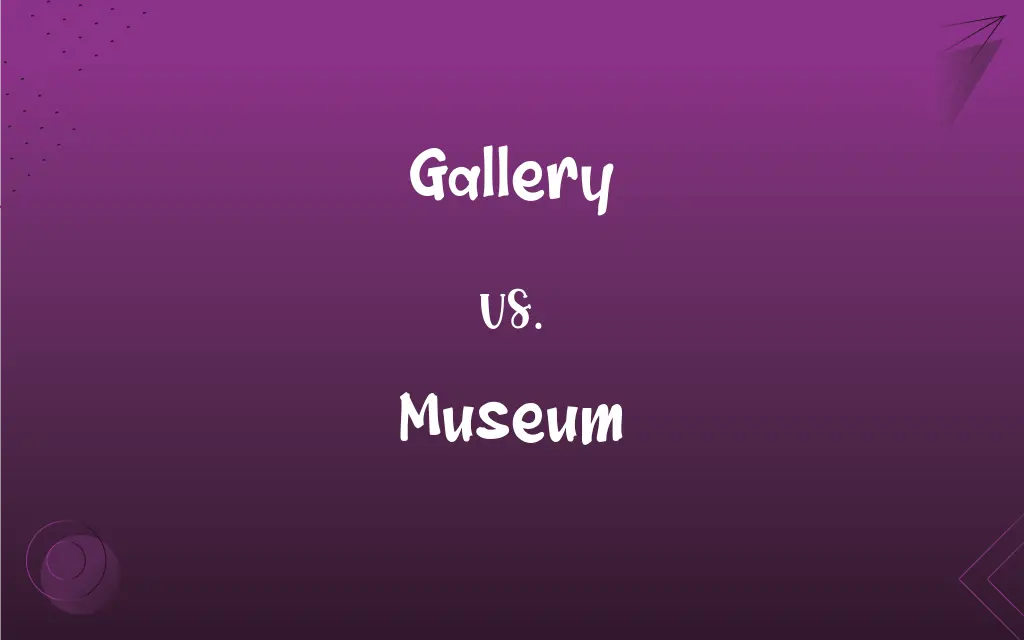Gallery vs. Museum: What's the Difference?
Edited by Aimie Carlson || By Janet White || Published on January 18, 2024
A gallery is a space for exhibiting art, often with a focus on contemporary works and sales, while a museum is an institution displaying artifacts and art for educational and historical purposes.

Key Differences
A gallery primarily serves as a space for the exhibition and sale of artworks, often featuring contemporary artists and their works. Museums, in contrast, are institutions dedicated to collecting, preserving, and exhibiting items of artistic, cultural, historical, or scientific importance.
Galleries are usually private or commercial entities focused on the art market, showcasing art for appreciation and purchase. Museums are often public or non-profit institutions, emphasizing education and preservation of collections for public benefit.
The scale of galleries can vary, from small local spaces to large, prestigious venues. Museums are typically more extensive, housing diverse collections that can include art, historical artifacts, and scientific specimens.
Galleries often host temporary exhibitions, showcasing different artists or themes periodically. Museums maintain permanent collections but may also feature temporary exhibits or special collections.
The experience in a gallery is often intimate and focused on individual artworks or a particular artist. In contrast, museums offer a broader educational experience, providing context and narrative for their collections.
ADVERTISEMENT
Comparison Chart
Primary Function
Exhibiting and selling art
Preserving and displaying historical, cultural artifacts
Focus
Contemporary art and artist promotion
Educational, historical, and cultural significance
Ownership
Mostly private or commercial
Typically public or non-profit
Exhibitions
Often temporary and changing
Permanent collections with occasional special exhibits
Experience
Intimate, focused on art appreciation and purchase
Educational, offering a broad perspective on collections
ADVERTISEMENT
Gallery and Museum Definitions
Gallery
Often hosts exhibitions of contemporary artists.
This gallery is renowned for showcasing emerging artists.
Museum
An institution for preserving and exhibiting historical, cultural, or scientific artifacts.
The museum's ancient Egyptian exhibit attracts thousands of visitors yearly.
Gallery
A venue for art appreciation and artist promotion.
Art enthusiasts gathered at the gallery for the opening night.
Museum
Provides a broad perspective on history, culture, and science.
Visiting the museum gave me a deeper understanding of medieval architecture.
Gallery
A space for displaying and selling artworks.
The gallery's latest exhibit features avant-garde sculptures.
Museum
Offers educational experiences through its collections.
School children visited the museum to learn about natural history.
Gallery
Can be a commercial or privately-owned space.
The downtown gallery specializes in modern abstract paintings.
Museum
Often operated by public or non-profit organizations.
The city's museum of science is funded by government grants and donations.
Gallery
Focuses on visual arts, including paintings, sculptures, and photography.
The photography gallery displayed a stunning collection of landscape images.
Museum
Houses permanent collections across various themes.
The art museum boasts an impressive collection of Renaissance paintings.
Gallery
A roofed promenade, especially one extending along the wall of a building and supported by arches or columns on the outer side.
Museum
A building, place, or institution devoted to the acquisition, conservation, study, exhibition, and educational interpretation of objects having scientific, historical, or artistic value.
Gallery
A long enclosed passage, such as a hallway or corridor.
Museum
A building or institution dedicated to the acquisition, conservation, study, exhibition, and educational interpretation of objects having scientific, historical, cultural or artistic value.
Visit the history museum
They're opening a new coin exhibition at the local museum.
Museum
A repository or a collection of natural, scientific, or literary curiosities, or of works of art.
Museum
A depository for collecting and displaying objects having scientific or historical or artistic value
FAQs
What is a museum?
An institution for displaying historical, cultural, or scientific items.
Are museums mostly educational?
Yes, museums focus on education and preservation.
What is a gallery?
A space for exhibiting and selling art.
Do galleries sell artworks?
Yes, galleries often sell the art they exhibit.
Can a gallery have permanent collections?
Galleries typically focus on temporary exhibitions.
What can you see in a museum?
Artifacts, art, historical items, and scientific collections.
Is a gallery visit educational?
It can be, focusing on art appreciation and contemporary art.
Do museums sell their exhibits?
No, museums usually don't sell their collections.
What types of art can you find in a gallery?
Contemporary art, including paintings, sculptures, and photography.
How do museums acquire items?
Through donations, purchases, and historical discoveries.
Are galleries usually private?
Yes, many galleries are private or commercial.
Can anyone open a gallery?
Yes, with the necessary resources and expertise.
Do museums offer interactive exhibits?
Many modern museums have interactive and educational exhibits.
Do galleries focus on specific art genres?
Some do, while others may feature a variety of art forms.
Can galleries host events?
Yes, many galleries host openings, artist talks, and private events.
What educational programs do museums offer?
Workshops, tours, lectures, and school programs.
Do museums have changing exhibits?
They have permanent collections and sometimes special, temporary exhibits.
Are all museums open to the public?
Most are, but some may be private or require membership.
What's the role of curators in museums?
They manage and oversee the collections and exhibitions.
How do galleries support artists?
By exhibiting and selling their work, and providing exposure.
About Author
Written by
Janet WhiteJanet White has been an esteemed writer and blogger for Difference Wiki. Holding a Master's degree in Science and Medical Journalism from the prestigious Boston University, she has consistently demonstrated her expertise and passion for her field. When she's not immersed in her work, Janet relishes her time exercising, delving into a good book, and cherishing moments with friends and family.
Edited by
Aimie CarlsonAimie Carlson, holding a master's degree in English literature, is a fervent English language enthusiast. She lends her writing talents to Difference Wiki, a prominent website that specializes in comparisons, offering readers insightful analyses that both captivate and inform.






































































